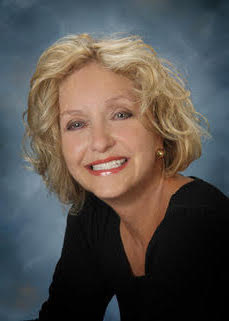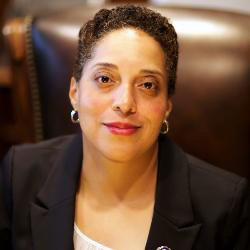How to restore trust for a profession in transition

Susan Smith Blakely.
There is a temptation to part company with the challenges and disappointments of 2020 and move full speed ahead into 2021 without looking back. As lawyers, however, we should not forget what we learned from the past year. Rather, we need to make some serious New Year’s resolutions.
In 2020, the pandemic took hundreds of thousands of lives; race relations broke down across the country; political battles raged; the presidential election turned ugly; and debates about election fraud carried on and on and on. And the disturbing and threatening events of 2020 have inevitably carried over into 2021.
These realities are disappointing and threatening to many Americans; however, they should be even more disappointing and threatening to lawyers, as they witness a breakdown of confidence in the rule of law, the very foundation of our judicial system and the moral compass that lawyers hold dear.
As caretakers of the rule of law, lawyers need to concern themselves with issues concerning lying and deception; tolerating discrimination and fostering unequal treatment among races; the requisite proof of fraud; and dereliction of duty.
Attacks on the legitimacy of the 2020 presidential election—often exercised with the aid of lawyers—are but one example of recent behaviors that have contributed to public perception of the law profession as corrupt, self-serving and opportunistic. To some observers, it appears that the lawyers are feeding the flames of a destructive fire.
As officers of the court, lawyers should not condone these behaviors nor be content to accept these realities and perceptions. They need to take every opportunity to exert effective leadership to reverse course in 2021. It is a role that lawyers are uniquely equipped to play, and it is their ethical duty to do it.
So, the question is: Where to begin? How do lawyers change course, buttress the rule of law and improve perceptions of the legal profession?
The focus of our resolve
As part of their New Year’s resolutions, lawyers should commit to restoring trust in our profession as protectors of the rule of law. They need to face the challenges of our present and our future by calling out inequities in our society and working to eliminate them. They need to stop behaving as sycophants enabling harmful behaviors and step forward with solutions as ethical and responsible law professionals. They need to recognize that they will be judged by the company they keep.
Lawyers should renew their commitments to pro bono representation, increase their participation in bar association programs to develop ethical and responsible young lawyers, and volunteer in law school clinical programs to show their dedication to the values underlying the profession.
Lawyers should focus on “cleaning their own houses” and driving out influences that contribute to negative perceptions about themselves and the profession. They should start by resolving to improve the quality of leadership within their firms and organizations.
They should aim to expel toxic managers who have no place in the profession and can cause irreparable harm to colleagues. Toxic managers and their reprehensible and self-centered behaviors are driving talent out of the profession, and these behaviors never should be justified or ignored in exchange for the promise of financial gain. Effective law leaders should beware of allowing profits alone to define success.
Effective leadership also should focus on at-risk cohorts within the profession. Senior lawyers need to pay particular attention to the cohort of young lawyers and make every effort to understand and effectively mentor them. The numbers of millennial lawyers are huge, and they should be embraced as important players in the future success of our institutions.
The cohort of women lawyers also needs to be the subject of resolve and increased attention. In addition to continuing to combat gender discrimination, implicit bias and unequal opportunity, law leaders need to be cognizant of the disparate impact of COVID-19 on women lawyers—some of whom may have lost positions during the economic downturn and others who have left jobs because the responsibilities of mother and lawyer and teacher during pandemic isolation proved to be too heavy a lift.
Women need to be welcomed back into law firms and organizations as the nation experiences economic recovery and the profession returns to some new rendition of pre-COVID-19 conditions.
And law leaders need to resolve to address the challenges of the parents of young children within their organizations. Both male and female lawyers are haunted by the impacts of COVID-19 on the well-being of their children, including concerns about fear, anxiety, and loss of friendships and interaction with peers. Law firms and organizations need to develop programs and policies to help members fulfill their roles as parents during these especially challenging times.
Recognizing our responsibilities as citizen lawyers
And, finally, lawyers need to be the citizen lawyers envisioned by Thomas Jefferson and use their knowledge of the law to promote the public good. They need to get involved in solutions at the grass-root levels where members of the profession have traditionally been so visible. Images of lawyers acting as community leaders and volunteers sends a powerful message and is an essential tool in restoring trust in the law profession.
Lawyers can volunteer at food pantries, take leadership positions in youth programs and be effective mentors in incubator programs to promote new businesses and young business leaders. They also can become members of not-for-profit boards and commissions to assist in the challenges of delivering important and fundamental services to a society in need—and so much more.
Lawyers have key roles to play in 2021. They need to step forward to be a part of the solution to end the nightmare of 2020 and contribute to a new era of healing for the profession and for the nation. It is a lot to do. But it is not too much to ask.
Susan Smith Blakely is a former partner, law career counselor and author of the Best Friends at the Bar book series for female lawyers. Her most recent book is What Millennial Lawyers Want: A Bridge from the Past to the Future of Law Practice.



